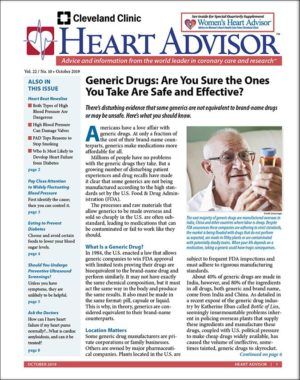Steps to Take When You Are Diagnosed with Prehypertension
As Director of Cardiac Rehabilitation at South Pointe Hospital, Cleveland Clinic cardiologist Chad Raymond, DO, sees the damage caused by high blood pressure every day. That’s why he makes a point of counseling patients whose blood pressure is on the rise.
“The heart can only adapt to high blood pressure for so long. Over time, the higher your blood pressure is, the greater your risk of heart attack, stroke, kidney disease and heart failure,” he says. “I tell patients with prehypertension that if we don’t do something about their blood pressure now, it will continue to rise, and one of these problems will catch up withthem.”
Although blood pressure tends to rise with age, hypertension is not inevitable. Most people with prehypertension can stop the upward creep by making simple lifestyle changes.
Why High Blood Pressure IsDangerous
© Monkey Business Images | Dreamstime

Blood pressure is read in two numbers represented by millimeters of mercury (mmHg) on the dial (sphygmomanometer) attached to a blood pressure cuff. The first number is the pressure when the heart is pumping. The second number is the pressure when the heart is filling. Both numbers are important.
The ideal blood pressure is a matter of debate. Most physicians continue to consider 120/80 mmHg optimal. Higher blood pressure readings force the heart to pump increasingly harder to push blood through the arteries. Over time, this extra work causes the heart muscle to become thicker, but not stronger. High blood pressure also damages the lining of the arteries, opening the door for fatty plaques to form and cause atherosclerosis.
In November 2017, the American Heart Association lowered the designation of hypertension from 140/90 mmHg to 130/80 mmHg. Elevated blood pressure is diagnosed when the first number is 120-129 mmHg or the second number is 80-89 mmHg. At this point, it’s time to take action to lower your blood pressure.
How to Lower Your Blood Pressure
Blood pressure tends to rise when we gain weight, eat too much salt or exercise too little, so tackling these lifestyle issues is the first step to lowering or stabilizing blood pressure.
“In people with prehypertension, simple lifestyle modifications can make all the difference. We recommend trying lifestyle changes first. If they don’t work, we can always add antihypertension medications later,” says Dr. Raymond.
He recommends the following:
1. Walk 30 minutes a day five or more days a week. Regular moderate exercise has been shown to reduce blood pressure five to 10 points, which is as effective as any medication. “You don’t have to be an athlete: Simply walk for 30 minutes at a rate that allows you to talk, and do it at least five days a week,” says Dr. Raymond.
2. If you can’t walk, find another form of exercise. Biking, swimming, water aerobics or using an elliptical machine are effective alternatives that are gentle on the joints.
3. Adopt a heart-healthy diet. The Mediterranean diet or the low-sodium DASH diet are easy to follow and heart-healthy.
4. Take unconventional recommendations with a grain of salt.The efficacy of garlic or apple cider vinegar in lowering blood pressure has not been well validated in clinical trials and is potentially harmful. “High doses of apple cider vinegar may cause potassium abnormalities that can trigger arrhythmias,” says Dr.Raymond.
If your blood pressure is higher than 160/100 mmHg, you will likely need at least two blood pressure-lowering medications in addition to lifestyle changes.
“Lifestyle medications alone will not lower high blood pressure sufficiently. However, patients who make radical lifestyle changes may eventually be able to stop using these medications,” he says.
The Results Can Be Spectacular
Patients with prehypertension who adopt these measures usually find their blood pressure drops—and with it, their increased risk of a fatal or nonfatal cardiac event.
Dr. Raymond has even seen cases of heart failure resolve.
“If we take steps to control blood pressure early on, the heart will often recover—sometimes completely,” he says.
Showing the single result
-

Heart Advisor Subscription
From: $18.00 / year Select options This product has multiple variants. The options may be chosen on the product page

